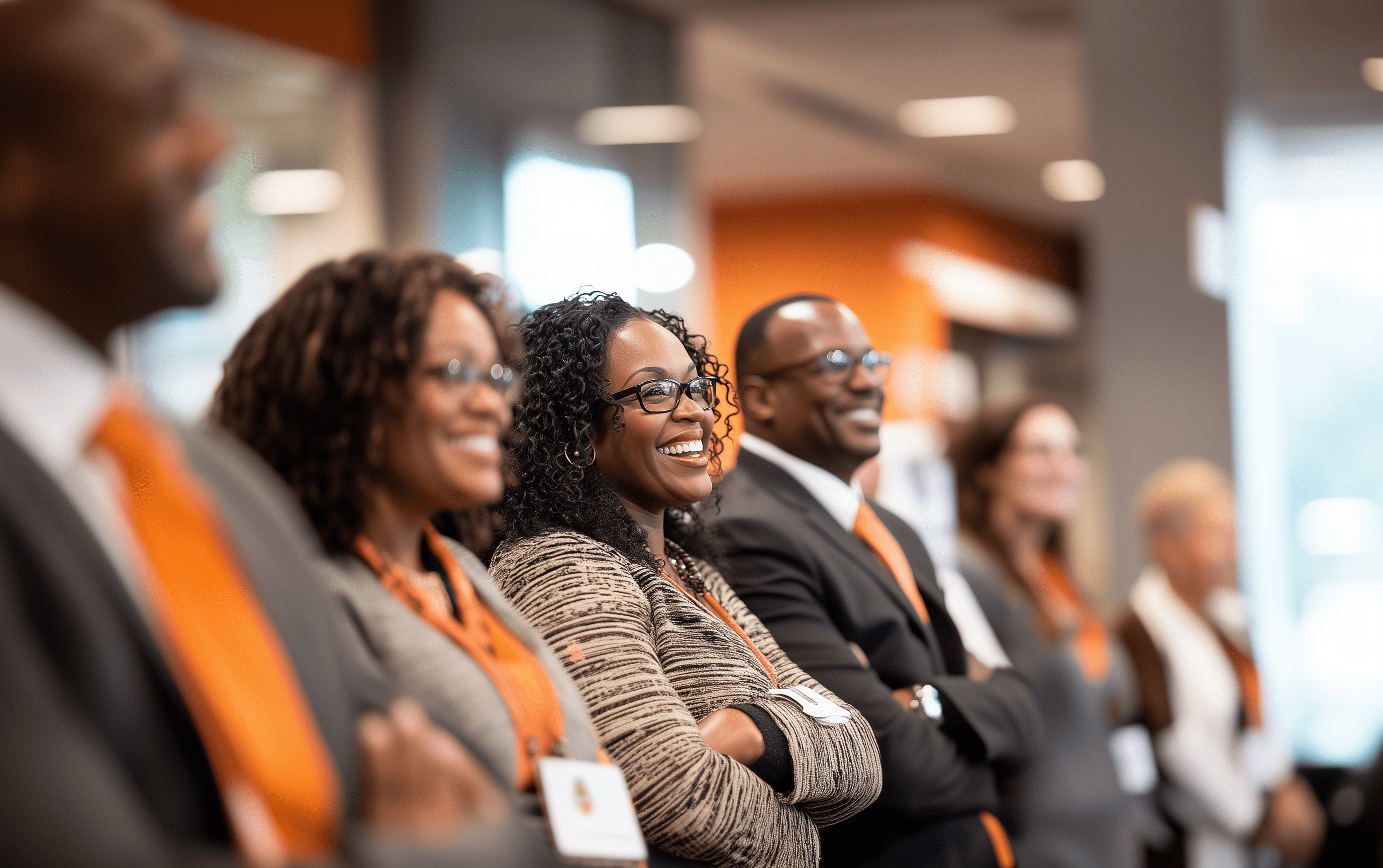The COVID-19 year has tested the four regional Chambers of Commerce and reinforced guiding principles inherent to their missions.

The unique characteristic that bridges the four regional Chambers of Commerce (the Fort Wayne Black Chamber of Commerce, Greater Fort Wayne Inc., the Greater Fort Wayne Hispanic Chamber of Commerce, and the Regional Chamber of Northeast Indiana) is that each one fills a unique set of needs.
Who they are and what they can do for each other was made more palpable during our collective pandemic year, beginning March 2020. Business People has marked this anniversary with four summaries of these vital organizations.
Fort Wayne Black Chamber of Commerce
The Fort Wayne Black Chamber of Commerce has always been busy, but never on such a visible level, says Board President Clifford Clarke. 2021 is heralding in a new renaissance for the nonprofit that has propelled itself through the pandemic.
“We just keep rolling,” Clarke says. Despite forgoing in-person networking and working virtually, “during COVID-19, we’ve been very productive with new members,” says Vice-president of Operations Linda Golden, who, as a business owner, transitioned into real estate and construction from nonprofit.
Historically, construction has been a focus of the Black Chamber. One of its early initiatives helped diversify construction trades for the 2015 Obama administration’s national mandate.
The FWBCC has partnered with Club 720 to guarantee construction opportunities on projects like Electric Works for diverse contractors and workers in the bidding and hiring processes. The nonprofit is also working on a similar partnership with the Fort Wayne Urban League. And has assisted in the creation of social justice programs, including diversity slots for city leadership positions, with the four Chambers featured in this article. The Black Chamber also worked with Fort Wayne United on the creation of United Front.
Internally, the FWBCC will soon unveil its rebranding, beginning in the Spring 2021 with the release of its second Black print directory with 500-plus listings, including businesses and nonprofits. The rebranding includes a new website and a survey about how Black Fort Wayne works, to be distributed later in the year.
The Black Chamber’s biggest challenge, Clarke says, “is having members understand what the Chamber does and what it does for them.” At one point, the FWBCC boasted roughly 100 members; now, its roster rests just under 50. “Membership is important, and we invite organizations to join that understand collectively we can do more than as individuals.”
1832 Paulding Road
Fort Wayne, Indiana 46816
(260) 441-0100
blackchamberfw.org (new site coming soon)
Years in business: 8
Greater Fort Wayne Inc.
In the summer of 2019, Greater Fort Wayne Inc. laid out an 18-month organizational strategy. When pandemic quarantining became an absolute, “we really didn’t deviate from it all,” says John Urbahns, GFW Inc. President/CEO. “Everything we set out to do was accomplished.”
GFW Inc. shifted its programs to virtual events. The nonprofit assisted companies that invested more than $169 million in Allen County, helping 20 businesses expand and relocate and created 1,850-plus new jobs.
“[We’ve been] able to continue with our strategy but layer on these different areas of need,” says President of Community and Corporate Impact Brenda Gerber Vincent.
At the start of lockdown, the staff began contacting its 1,400 members, offering encouragement and compiling business intel to send to its local and state leaders, and its federal delegation in Washington D.C. GFW Inc.’s research led to a webinar series “Roadmap to a Healthy Reopening,” partnering with Parkview Health and the Allen County Department of Health, that has already racked up 12,000-plus views.
Early visibility led to an increase in membership by 18. “We kept them so engaged and extremely communicative, and people were genuinely appreciative,” Gerber Vincent says, “that we were able to show the true value of a Chamber.”
The biggest take away from the pandemic, Urbahns says, is that “people really want to get together and connect.” In-person meet-ups have been socially-distanced, but Gerber Vincent, in particular, has led GFW Inc.’s actions on United Front, a sub-organization of Fort Wayne United that will create and lead a program for cultural competency training, racial healing and unity.
After the Black Lives Matter movement, GFW Inc. has worked closely with the Black and Hispanic Chambers. “We can do better as a business community, but we can’t do it without each other,” Gerber Vincent says.
200 E. Main St., Suite 800
Fort Wayne, Indiana 46802
(260) 420-6945
greaterfortwayneinc.com
Years in business: 8
(as Greater Fort Wayne)
Greater Fort Wayne Hispanic Chamber of Commerce
Reynol Treviño’s father Benito was one of the founding members of the Greater Fort Wayne Hispanic Chamber of Commerce in 1990. Benito owned Laredo Mexican Restaurant.
“My dad thought the Hispanic Chamber was a valuable organization to be a part of,” Treviño said. “He was blue collar… maybe a little uncomfortable to be in that business atmosphere.” It’s why he nudged his son in that direction. Treviño, GFWHCC’s Board Chair, says his father’s hesitancy underlines one present-day recruitment hurdle: first and second generation Hispanics who are uncomfortable in the professional realm. “If they feel self-conscious, they don’t seek help.”
The GFWHCC’s uses education to break down “the walls of insecurity in the business world,” Treviño says. It’s the chamber’s biggest hurdle outside of COVID-19.
The 100 members from two years ago dipped slightly to 80 in 2019. By the end of 2020, its membership was around 60. “COVID-19 has caused our membership to drop because we can’t meet in person,” says GFWHCC Part-time Executive Director Herb Hernandez, another original founder.
The Hispanic Chamber’s quarterly meetings, with keynote speakers and networking sessions have gone virtual. Some members have struggled with Zoom-meeting technology, or, even worse, aren’t excited by it.
In the past, the Chamber has produced highly visible projects and events, like its partnerships with the Fort Wayne Museum of Art on a Cheech Marin Chicano Art exhibit and the Fort Wayne Tin Caps. The Hispanic Chamber would have celebrated its 30th anniversary in 2020, but the celebration was postponed in light of the pandemic.
As for its external branding, the Hispanic Chamber fights the perception that it’s comprised of “all restaurant and taco stands,” Treviño says. “There are other individuals from professional fields, like attorneys, sales and marketing… it runs the whole gamut.”
(Mailing address)
200 E. Main St., Suite 126 (8th Floor)
Fort Wayne, Indiana 46802
fwhispanicchamber.org
Years in business: 30+
Regional Chamber of Northeast Indiana
“There are places in Fort Wayne that don’t have access to high speed internet,” says Bill Konyha, President/CEO of the Regional Chamber of Northeast Indiana and registered legislative lobbyist. The lobbying firm RCNI, promoting an environment to prosper in a global economy, is comprised of 15 local chambers, with at least one chamber in all 11 northeast Indiana counties: Adams, Allen, DeKalb, Huntington, Kosciusko, LaGrange, Noble, Steuben, Wabash, Wells and Whitley.
Their membership includes private sector members such as BF Goodrich, Fort Wayne Metals, Lake City Bank, STAR Financial Bank and Steel Dynamics, with small and large employers engaged in multiple areas, like development, construction, health care, manufacturing and REMCs, to name a few.
During the pandemic, the RCNI determined through its research and work with regional REMCs that all 11 counties could be wired with high-speed internet for $135 million within three years, a reachable goal.
Rural broadband, or regional connectivity, and early childhood education are two of three items that Konyha and the RCNI have labeled as “the next big things.” Number one being the conversion of U.S. Route 30 to a limited-access freeway from Ohio to Route 49 in Valparaiso.
“We’re pretty confident we will cross off one of the [next big things] and just focus on the other two for our agenda for the year,” says Konyha.
For other pandemic-related action, the nonprofit has lobbied intensively for relief from civil liability for employers from potential claims made against businesses associated with COVID-19. “Our position is we want to protect good employers,” Konyha says.
Generally, the nonprofit lobbies legislature for issues in three pillars of progress and economic development: 21st Century Talent (development, recruitment and retention), Competitive Business Environment, and World Class Infrastructure.
200 E. Main St., Suite 910
Fort Wayne, Indiana 46802
(260) 234-2288
neinadvocates.com
Years in business: 10


